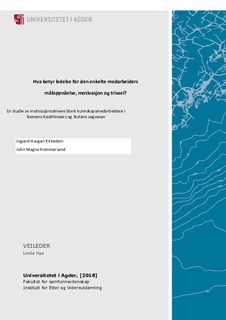| dc.description.abstract | This assignment is a qualitative study of what leadership means for the individual employee's goal achievement, motivation and well-being. We have derived 2 issues that we want to answer:
1) What motivation factors characterizes employees of the Norwegian Public Roads Administration and Siemens Healthineers?
2) How can leadership contribute to the goals, motivation and well-being of individual employees?
Norway is one of the countries in the world with the highest number of credits, bachelor and master's degree in the occupational population. The typical Norwegian workplace is
characterized by the fact that the employees have high education. More and more organizations can be characterized as knowledge-intensive.
This poses new requirements for managers. With a highly educated workforce, it is less effective with a management test based on notions of leaders who are officers, and subordinates as more or less willing and reluctant soldiers. Knowledge workers assume independence, and knowledge-intensive production is offered to the business if the employee so wishes!
Managers often have to cooperate, preferably in closely interwoven groups or teams. Managers often do not know in detail what work operations are going to be done. They can only act to a limited extent in the role of expert managers, which gives the employees detailed instructions on what to do step by step. Instead, managers can make a difference by motivating their employees, being good role models by giving challenges, paying particular attention to each employee's personal responsibility, and not least by arranging for the employees to have a good platform to work out. How skilled organizations are to "trigger" motivation among their employees will undoubtedly be an important competitive factor in the labor market in the future for employees to thrive and businesses will achieve their goals.
The empirical material was collected through semi-structured interviews by employees at Siemens Healthineers and the Norwegian Public Roads Administration. It is interpreted from a phenomenological approach and the findings are discussed in light of theories of motivation and leadership.
The main findings in our survey shows that management is central to the motivation of employees in Siemens Healthineers and the Norwegian Public Roads Administration. Our respondents explain the way they are managed, and the relationship or relationship to managers, as a decisive factor in how to work at work, how to thrive and how to be motivated. A leader who succeeds in creating and maintaining a good relationship with his employees, lays the foundation for success in reaching the department's goals. Otherwise, the opportunity is great for the employees not succeeding, and in the utmost consequence seek out of the workplace.
Another clear finding in the survey is the importance of relationships about the job itself. These are conditions that are related to dissatisfaction, but you may not think so much of your daily life. There may be employment, salary, IT tools, relationship with colleagues or immediate manager, internal status or other things. Common to these are that they easily ignore the importance they have for employee motivation and well-being. There are also relationships that can often be overlooked by management and thus do not put much emphasis on it. Equally, our survey shows that they are important, especially if these elements or factors are not well taken care of.
Our survey finds that there is a clear link between motivation and well-being and achievement. This is by no means surprising, but we have tried to figure out how this link is present and what affects these three elements in a positive or negative direction. One of the things that comes highly expressed is the importance of leadership. How leaders act towards their employees and how they exercise their leadership is very important. This influences the motivation for the employees and thus also the degree of goal achievement. In other words, a manager can directly influence the results of the company by directing the employees in such a way that it creates motivation and well-being. | nb_NO |

